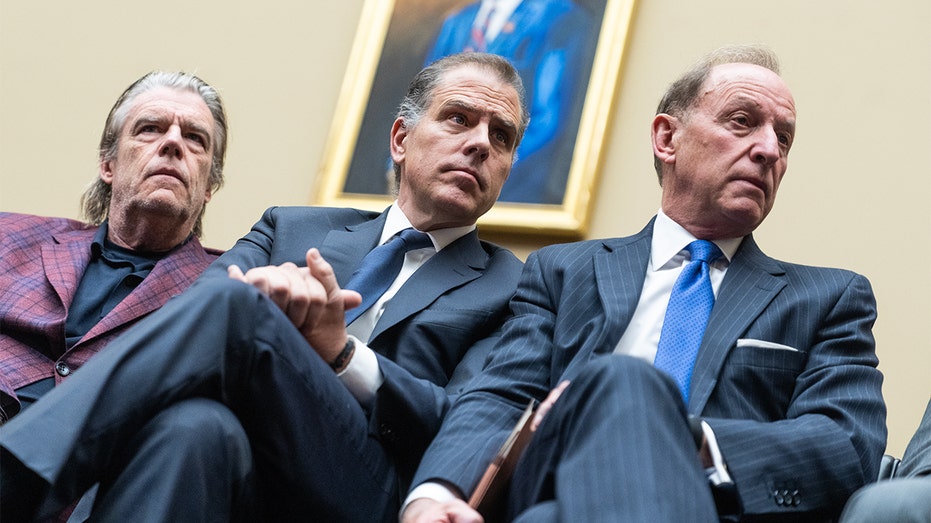Johnson faces tough road on Trump agenda after dramatic Speaker vote
Speaker Mike Johnson (R-La.) kept his gavel amid a threat from the right flank of the House GOP, but managing the House GOP is not going to get any easier from here. The dramatic Friday Speaker vote on the House floor – in which three Republicans nearly kept Johnson from the gavel before two of them...

Speaker Mike Johnson (R-La.) kept his gavel amid a threat from the right flank of the House GOP, but managing the House GOP is not going to get any easier from here.
The dramatic Friday Speaker vote on the House floor – in which three Republicans nearly kept Johnson from the gavel before two of them reversed course to support him – showcased the challenges ahead as Johnson aims to usher President-elect Trump’s ambitious legislative agenda through a razor-thin House majority.
Around a dozen Republicans had withheld support for Johnson ahead of the vote, demanding that Johnson make commitments on spending reductions and a more open process for crafting major legislation.
Rep. Chip Roy (R-Texas), who had withheld support for Johnson up to the vote, referenced widespread frustration with how Johnson handled a December short-term spending bill while issuing a warning.
“If anything happens like happened before – right before Christmas, there will be consequences,” Roy told reporters after Johnson’s election.
The point of a number of members initially withholding votes for Speaker, Roy said, “was about making clear to the conference that there's a block of folks who are going to want to make sure that we actually deliver.”
Johnson, for his part, did release a public statement shortly before the vote making commitments on working groups to implement government-reducing reforms. And after securing the gavel, he projected openness to scrutiny from members.
“It’s a very different situation than the last Congress was, and they can hold me accountable for that,” Johnson told reporters after the vote. “We’re going to have a member-driven, bottom-up process for this really important legislation, and we must succeed. We have no margin for error.”
Johnson’s top priority, now, will be crafting one or two bills jam-packed with Trump agenda items – such as extending Trump’s tax cuts and addressing border security – which they aim to pass through a party-line “reconciliation” process that bypasses the threat of a Democratic filibuster.
But getting the fractious House GOP behind the package could prove to be as tall of a task for Johnson as it was to secure the votes to be reelected Speaker.
In the razor-thin House majority, opposition from just a member or two can sink any party-line measure. The House currently has 219 Republicans and 215 Democrats, with that margin set to get even slimmer when a number of House members join the Trump administration.
Senate Majority Leader John Thune (R-S.D.), in an interview with NBC’s Kristin Welkerfor “Meet the Press” that was conducted as the House was choosing its Speaker, said that Johnson has “a really, really tough job” with that margin.
“He's got a lot of folks that are headed in different directions,” Thune said. “I mean, as you know, that with a narrow margin like that, any individual member of the House of Representatives can have a huge impact.”
“We will need to be as a Senate and with the White House working closely as a team, if we're going to get an agenda done that we want to accomplish for the American people,” Thune said.
Plans for that massive bill of Trump priorities also got a new wrinkle last week of Trump’s surprise demands last month to raise the debt ceiling. To meet Trump’s request, House Republicans in December struck a handshake agreement to raise the debt ceiling in the reconciliation bill by $1.5 trillion while pairing it with $2.5 trillion spending cuts.
But figuring out those cuts and meeting those steep spending demands will be very tough, as forecasted by Rep. Ralph Norman (R-S.C.) – one of the Republicans who voted for a candidate other than Johnson before switching to support him.
“When the reconciliation bills come up and people have to sacrifice, because every dollar spent up here has got an advocate, fight for it,” Norman said of what he expects from the Speaker.
“If the cut is defined as a reduction of the increase, that's not going to sit well for a lot of us, and we're not putting up with that,” Norman added.
Rep. Keith Self (Texas), the other Republican who switched his vote from another candidate to Johnson, said that commitments from Johnson on who will be designing that massive bill helped win him over.
“We shored up the reconciliation team, because we know this will be a heavy lift to get the Trump agenda across the line in the reconciliation package,” Self said. “So, we shored up the negotiating team. That’s all we did.”
Self declined to elaborate on who the negotiating team would be, but said that it would include members beyond the leadership, including members of the House Freedom Caucus.
House Republicans are set to hold an all-day planning session for that Trump agenda bill on Saturday.
Johnson’s struggles do not stop there.
Eleven board members of the hard-line conservative group, including Roy, also sent a warning shot to Johnson in the form of a letter.
The members said that while they voted for Johnson to be Speaker “because of our steadfast support of President Trump and to ensure the timely certification of his electors,” they had “sincere reservations regarding the Speaker’s track record.”
The members made a number of requests in the letter, including that the reconciliation package should reduce spending and the deficit, that members must be allowed to offer amendments to legislation, and that leadership should abide by a 72-hour rule to give members time to read and debate proposed legislation.
The number of members on that letter is notable given the new 9-member threshold on triggering a snap vote on ousting the Speaker, known as the “motion to vacate.” If the 11 banded together, they could force Johnson out of the Speakership.
Rep. Andy Ogles (R-Tenn.), one of the 11 who signed that letter, said that the threat of ouster is an important accountability measure.
“You got to be careful. Nobody wants to have, you know, sword over their head, but we have a motion to vacate for a reason,” Ogles said of Johnson. “He's been given a job. He's got to go do that job.”
Mike Lillis, Mychael Schnell, and Rebecca Beitsch contributed.



